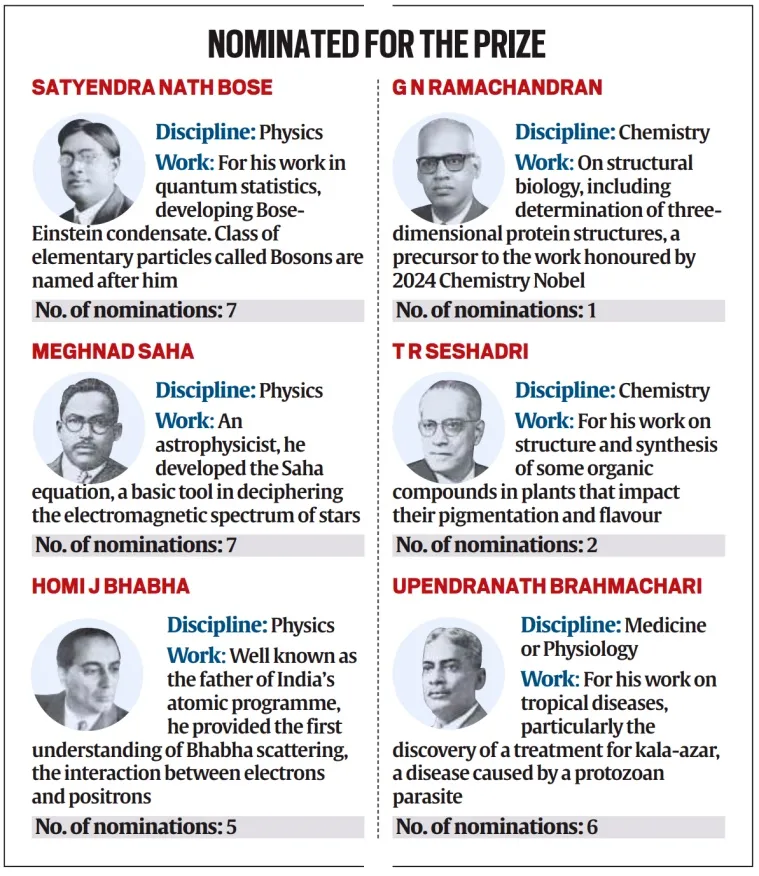- Courses
- GS Full Course 1 Year
- GS Full Course 2 Year
- GS Full Course 3 Year
- GS Full Course Till Selection
- Answer Alpha: Mains 2025 Mentorship
- MEP (Mains Enrichment Programme) Data, Facts
- Essay Target – 150+ Marks
- Online Program
- GS Recorded Course
- Polity
- Geography
- Economy
- Ancient, Medieval and Art & Culture AMAC
- Modern India, Post Independence & World History
- Environment
- Governance
- Science & Technology
- International Relations and Internal Security
- Disaster Management
- Ethics
- NCERT Current Affairs
- Indian Society and Social Issue
- NCERT- Science and Technology
- NCERT - Geography
- NCERT - Ancient History
- NCERT- World History
- NCERT Modern History
- CSAT
- 5 LAYERED ARJUNA Mentorship
- Public Administration Optional
- ABOUT US
- OUR TOPPERS
- TEST SERIES
- FREE STUDY MATERIAL
- VIDEOS
- CONTACT US
No Indian Working in India Has Won a Science Nobel in 94 Years
No Indian Working in India Has Won a Science Nobel in 94 Years
22-10-2024
- It has been 94 years since C.V. Raman won the Nobel Prize in Physics in 1930 as the only Indian working in India to receive this honor.
- Although other Indian-origin scientists have won Nobel Prizes in various scientific fields, they conducted their work outside India and were not Indian citizens at the time.
Indian Nobel Laureates in Sciences:
- C.V. Raman: Physics, 1930 (working in India)
- Hargovind Khorana: Medicine, 1968 (work done in the USA)
- Subrahmanyan Chandrasekhar: Physics, 1983 (work done in the USA)
- Venkatraman Ramakrishnan: Chemistry, 2009 (work done in the USA)
Reasons for Lack of Indian Winners in Science Nobel
- Public funding for basic research remains low, averaging 0.6-0.8% of GDP over the last decade, significantly lower than other BRICS nations.
- India's total R&D spending has dropped from 0.82% to 0.64% of GDP between 2005 and 2023.
- Bureaucratic processes slow down research; for example, equipment procurement at institutions like IIT Delhi can take up to 11 months.
- Institutions face challenges like hefty GST notices, which impact their operational capacities.
- India has a disproportionately low number of researchers compared to its population—approximately five times lower than the global average, reducing the pool of potential Nobel candidates.
- Research success often relies on the brilliance of individual scientists rather than a supportive ecosystem, which diminishes systemic innovation potential.
- Leadership within research institutions may prioritize personal accolades (e.g., Padma Shri, Bharat Ratna) over promoting research.
- Many scientists focus on outdated topics with little practical relevance to India, such as complex nuclear projects, while ignoring urgent needs in areas like water technology and agriculture.
- Research outputs often prioritize quantity, leading to numerous publications that lack significant innovation or societal impact.
- Indian scientists frequently replicate or adapt existing foreign technologies rather than developing original solutions, limiting opportunities for significant scientific breakthroughs.
- The notable achievements in vaccine development during the COVID-19 pandemic highlight a disconnect between public research institutions and successful innovations in the private sector.
Notable Nominations:
While there have been nominations for the Nobel Prize from Indian scientists, many have not resulted in awards.

- Meghnad Saha, Homi Bhabha, and Satyendra Nath Bose (Physics).
- G N Ramachandran and T Seshadri (Chemistry).
- Upendranath Brahmachari (Medicine).
Nominations remain confidential for 50 years, and thus only a limited number of Indian scientists are known to have been nominated.
Historical Disappointments:
- Jagadish Chandra Bose: Innovator of wireless communication, but ignored despite significant contributions, as the Nobel went to others for similar work.
- K S Krishnan: Co-discoverer of the Raman effect, never nominated despite his close collaboration with C.V. Raman.
- CNR Rao: Notably recognized for solid-state chemistry but has not received the Nobel Prize.
- The most controversial omission of an Indian has been that of ECG Sudarshan, who was ignored for the prize not once but twice.
- The Nobel Prizes in Physics, in 1979 and in 2005, were given for work in which the most fundamental contributions had come from Sudarshan.
- But Sudarshan, who passed away in 2018, had become an American citizen in 1965 and most of his work was accomplished in the United States.
Western Dominance:
- The Nobel Prizes in sciences have predominantly been awarded to researchers from the United States and Europe, with very few laureates from Asia, Africa, or South America:
- Only 13 of 227 Physics winners, 15 of 197 Chemistry winners, and 7 of 229 Medicine winners came from these regions outside the West.
Comparative Statistics
- China: Despite substantial investment in research, has only produced three Nobel laureates in sciences.
- South Korea: No laureates, despite high research output.
- Israel: Only four Chemistry winners, despite significant research prowess.
Government Initiatives for Research Promotion
- Anusandhan National Research Foundation (ANRF)
- Technology Incubation and Development of Entrepreneurs (TIDE 2.0)
- VAIBHAV Fellowship
- IMPRINT-II (Impacting Research Innovation and Technology)
- SERB Science and Technology Award for Research (SERB-STAR)
- IMPRESS (Impactful Policy Research in Social Science)
- SPARC (Scheme for Promotion of Academic and Research Collaboration)
Must Check: Best IAS Coaching In Delhi
UPSC Prelims Result 2024 Out: Expected Cut Off & Other Details, UPSC Prelims 2024 Answer with Explanation, Daily Prelims Quiz, Daily Current Affairs, MONTHLY CURRENT AFFAIRS TOTAL (CAT) MAGAZINE, Best IAS Coaching Institute in Karol Bagh, Best IAS Coaching Institute in Delhi, Daily Mains Question Answer Practice, ENSURE IAS UPSC Toppers, UPSC Toppers Marksheet, Previous Year Interview Questions, UPSC Syllabus




